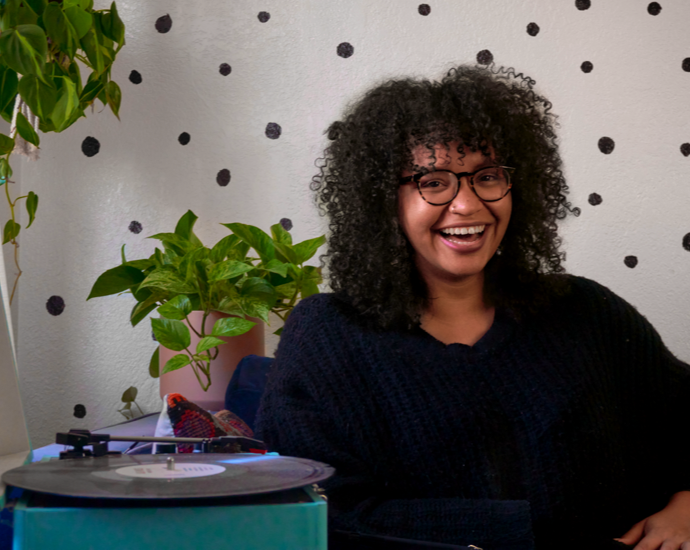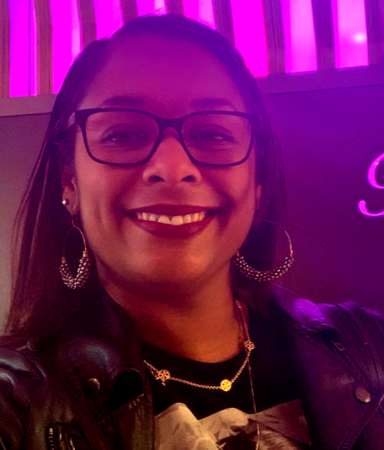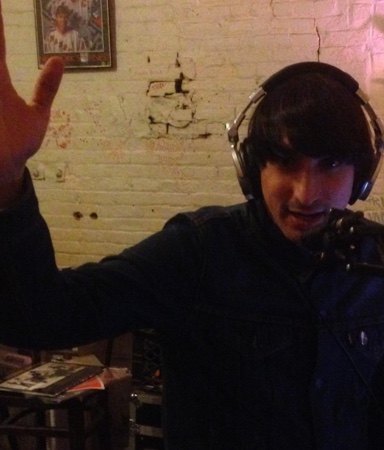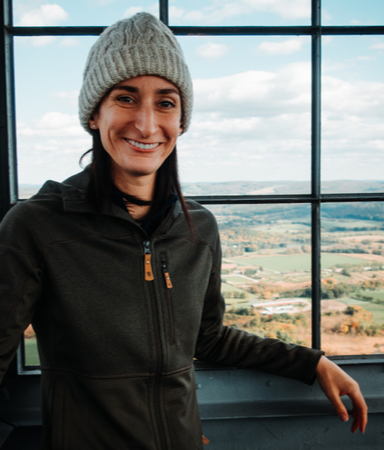Where are you based?
Kansas City, Missouri
Where do you work? What do you do?
I’m the Communications Manager for Folk Alliance International, a 32-year old arts nonprofit that works to preserve, present, and promote folk music globally. We host an annual folk music industry conference that brings over 3,000 people from all over the world under one roof. We also work on year-round advocacy efforts for the folk community, prioritizing diversity, equity, and inclusion throughout all our programs. The past year has forced us to adjust our usual plans and create more digital offerings than we’ve ever had before, which has allowed us to reach audiences we wouldn’t have been able to in-person.
We also present the International Folk Music Awards (IFMAs) each year, which honor industry leaders, legends, unsung heroes, and rising talent in the folk community. The award show will be virtual this year (of course), happening on Sunday, February 21 as part of the Folk Unlocked Virtual Conference. I’m really excited about the nominees this year! You can check out the list here.
What are you listening to?
I’m the kind of person who fixates on songs or albums and binges the heck out of them for months, so it would be dishonest for me to neglect mentioning that Glass Animals’ latest album, “Dreamland”, has been taking up a LOT of space for me musically for the last six months. Seriously, it’s kind of embarrassing how much I listen to that album.
I just started listening to Adia Victoria, and she’s incredible (she’s also nominated for Song of the Year at the International Folk Music Awards!). I love the dark moody vibes of her songs, and she isn’t afraid to sing about things that make folks uncomfortable. I am ALL about Black women in roots music. The more, the better. When I first started working in the folk community, I felt somewhat out of place as a Black woman, but seeing artists like Rhiannon Giddens, Leyla McCalla, Yola, Kaia Kater… it really opened my eyes to what folk truly is.
I also love YEBBA, Kuinka, SZA, Cardi B, Megan Thee Stallion, Lula Wiles, Lizzo, Billie Eilish, ROSALÍA, Sam Smith, Darlingside… I’m a bit all over the place.
How do you discover new music?
One of my favorite places to pick up new songs is through TV shows, actually. I know I’m going to love a song if I hear 15 seconds of it in a scene and immediately have to ask Siri what’s playing! I’ve also discovered some good songs from Apple Fitness+ workouts, so that’s been fun.
Other than that, one of my biggest music discovery sessions is always at the annual Folk Alliance International conference. I’m lucky that my job requires me to go around and document everything happening on social media, so I happily get to sit in on a ton of showcases and pick up on new artists to add to my playlists. I think one of my favorite discoveries from a past conference is Rosier, a Québec folk trad group that sings primarily in French. I don’t speak French AT all, but I was immediately hooked on their music when I popped into their showcase one night in a tiny hotel room in Montreal and they’ve been a regular in my music rotation ever since.
That’s the kinda cool music discoveries that happen at Folk Alliance. You never know what you’re going to stumble on, and you’ll find music from pockets of the world that you’ve never even heard of.
“I know I’m going to love a song if I hear 15 seconds of it in a scene and immediately have to ask Siri what’s playing!”
What formats do you usually listen to? LP, CD, Cassette, Digital, Streaming Services? Why?
Honestly, I’m a Spotify junkie. I’m aware of what that means for artists, though, so I always buy merch, CDs, or vinyl whenever I can. I’m probably one of the few people left with a CD player in their car, so I’ve been re-building my CD collection over the past few years!
I like Spotify because it’s a way to discover new music I never would’ve even known about. Those damn algorithms just work. Plus, the user interface is nice. I’m an Apple girl through and through, but I made the switch from Apple Music a few years ago and haven’t looked back since.
Where do you do most of your music listening?
Well, thanks to the pandemic, I’ve been working from home since March of last year. My favorite part about that is I can now blast my music on my speakers all day long! I’m probably listening to music for at least six out of the eight hours I work every day.
I also like to listen to music while going on long walks or knitting. That’s when I can actually clear my mind and just listen to the music, rather than having it as background noise.
How do you find and listen to pre-release music?
Normally, it would be through album release shows locally. But of course, that isn’t happening right now.
What are your frustrations with listening to music digitally? Any benefits?
I love being able to listen to music wherever I am. I have an endless amount of songs available at my fingertips… which doesn’t come without problems. There is SO much music out there that I want to listen to, and there just isn’t enough time to ever get through it all! I guess that’s a good problem to have, but as someone who listens to a lot of different genres, it can be pretty annoying. I’m always falling behind on the latest music in some genre because I’ve only had time to focus on another.
“There is SO much music out there that I want to listen to, and there just isn’t enough time to ever get through it all!”
How do you keep track of everything you are listening to?
Ugh, I struggle with this so hard. I have a pretty diverse list of playlists based on genres, moods, dates, etc. If I discover a new song that fits into a specific genre playlist, that’s an easy add. Over the last couple of years, though, I started creating playlists for each year, which are mostly full of songs that I “discovered” that year (discovered being a loose term, it doesn’t necessarily mean the song was released that year).
I just made a playlist for my favorite cover songs, and one for songs that I just… enjoy singing (to myself, alone, in my apartment). I try to create as many categories as possible so that I have a playlist for every mood/activity, but I also don’t like having too many playlists, so I go back and delete old ones that I don’t listen to often.
I do use the favorite feature on Spotify, but I usually never go back and look at my favorited songs anyway because it’s waaaay too overwhelming. So I definitely do end up losing some songs that I really like, which is super annoying!
Do you tip other people off to new music? How?
Eh. I have a couple of friends that I send recommendations to (and they send me stuff, too!) because we have similar tastes, but I often find that the stuff I REALLY want to share, my friends wouldn’t really be into anyway.
I did make a playlist of all women artists (or women-led groups) that I passed around to some folks who did end up enjoying it. I wouldn’t say I’m much of a curator, though. I mostly just keep it all to myself!
Anything you want to “promote”?
This year, FAI is hosting a digital version of our annual conference, called Folk Unlocked. We are SO stoked about it. Seriously, the panel offerings are amazing and we have tons of artists from around the globe showcasing (like more than 500)! When COVID hit, it was a really scary time for us because we had no idea what the future held. We’re a non-profit, so the funds certainly aren’t endless, and we had to take a huge financial hit by canceling our in-person conference.
I’m really proud of the work our team has done to bring our conference to the digital world, and the bonus is that registration is pay-what-you-can. This means that folks who’ve never been able to attend FAI because of financial restraints can come see what it’s all about in a way that’s affordable for them.




